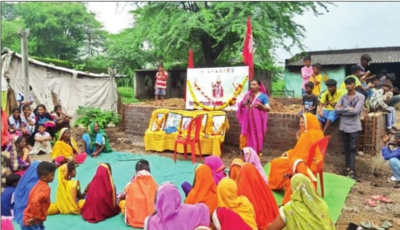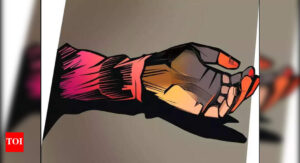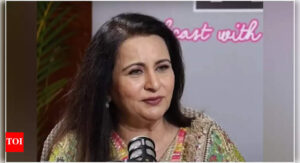Junk the ghoonghat, walk the talk

Married at 16, Ashalata Pandey of Ambajogai — a temple town known as the ‘maternal home of education’ in Maharashtra’s Beed — had to hide her face after her husband left for a religious trip one fine day, from which he never returned.
“Aren’t you sad about the fact that he left you?” “How can you simply move on?”
These were just some of the questions that the young mother of two was bombarded with on her way to work at an NGO that fetched a meagre monthly pay of Rs 800, to raise awareness on a range of issues from women’s rights to reproductive health.
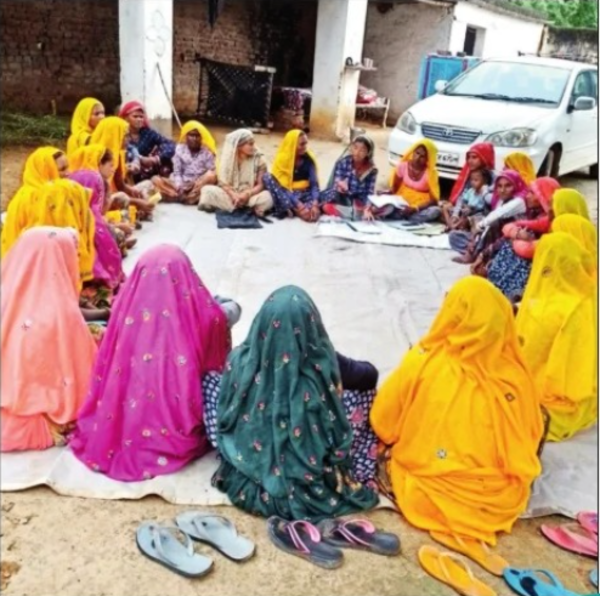
Stung by such adverse comments, Ashalata quit her job. With no property of her own and no support from her in-laws, she took up the job of an ASHA worker. Covering her head, like a shroud, with the edge of her sari, she took deserted roads on her way to work to ensure she kept those inquisitive glares at bay.
It was during one of those solitary walks to work that Ashalata had a chance encounter with Chitratai.
Married off at 12 by an alcoholic father to a man desperately looking for dowry, Chitratai aka Chitra Patil was not just a cheerful health worker, but also a newly-minted ‘saheli’ who had freed several villagers from greedy money lenders by creating 14 savings groups that charged a 2% fixed interest rate.
Encouraged by Chitratai, Ashalata enrolled herself for the grassroots leadership development programme (GLDP) and on the very third day of the course, she realised she was entitled to certain rights, including the right to her husband’s property.
“My father-in-law owned a large house. I wanted to co-own it, rightfully. Now, I actually do,” says Ashalata, sharing her expe rience from being an ‘SW’ (single woman) to one of the many vocal, local leaders of Ekal Mahila Sangathana (EMS) -a women’s organisation in Marathwada that galvanises its 22,000-strong marginalised population of abandoned, separated, widowed women into becoming agents of social change.
Ashalata is currently working on violence against women across Marathwada.
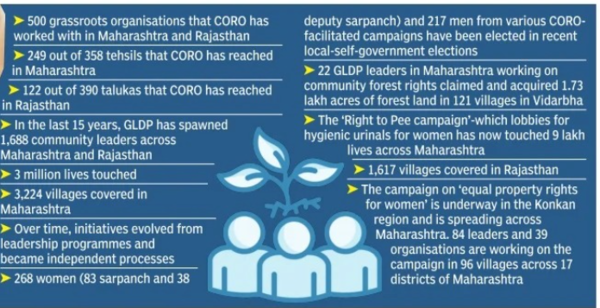
Started a decade ago by 27 single women in Beed, Latur, Osmanabad and Nanded -the rustic western Maharashtra belt -EMS today boasts of nearly 22,000 members.
Having rescued droves of single women from social stigma, unemployment and domestic violence, EMS is one of more than 500 organisations across Maharashtra and Rajasthan that have been facilitated by non-profit CORO India.
“CORO stands for ‘Jyanche prashna tyanche netrutva’ (the question is the same as the truth). The drive to initiate change should come from within,” says Dr Sujata Khandekar, founder of the 34-yearold holistic community development NGO.
Formed in 1989 by people from privileged backgrounds, CORO later evolved into “a people’s organisation, with people not as mere beneficiaries but as leaders of the organisation”, as Mahendra Rokade, the director of CORO, puts it.
In the last three decades, its efforts in rural and urban Maharashtra and Rajasthan have created more than 1,688 “grassroots leaders”, of which, 69% are women -including transwomen.
Majority of these earthy change-makers hail from notified and denotified tribes, backward classes, minorities and other marginalised communities. These leaders – aged between 20 and 50 – now address issues ranging from gender rights to forest rights.
“Since women are constantly and consistently denied permission to do things since childhood and punished for transgressing those boundaries, later in their lives, women themselves start believing that they are lesser humans,” explains Khandekar.
Culled over two decades, such insights paved the way for the Grassroots Leadership Training Programme (GLDP) -a syllabus spanning skills such as advocacy and constitutional rights that were inspired by Brazilian educator Paulo Freire’s philosophy of ‘conscientisation’. Meanwhile, EMS, which began working on ensuring safety and access to govt schemes for single women in areas where they were seen as “commodities up for grabs”, has now percolated into remote Rajasthan where Teena Rawat, who survived two suicide attempts after her husband abandoned her, now beams proudly inside a courtroom where she is defending herself as a lawyer. “If you hadn’t abandoned her,” the judge told her former husband against whom she had filed five cases, “this woman would have spent her whole life following you around in a ghoonghat. Instead, she’s a lawyer now. Look at how little you’ve achieved and how much she has done with her life”.
CORO recently launched Atta Deep Academy of Grassroots Leadership in Mumbai as an extension of GLDP. “ ‘Atta Deep means selfenlightenment’,” says Khandekar.
The arrival of four transwomen has expanded CORO’s lens on gender issues. Case studies in its 2023 annual report point to how issues addressed by grassroots women leaders transcend gender.
Udaipur’s Durga -who learned how to open and operate a Facebook account during her fellowship -was surfing the net casually one day when she chanced upon a govt website listing the names of 42 villagers that had received money to build cattle sheds. “None of the people concerned even knew that their applications had been approved,” recalls Durga, who downloaded the receipts and armed with those printouts, the villagers then pressurized the sarpanch into giving them their rightful share.
That’s change. That’s power…
➤ 500 grassroots organisations that CORO has worked with in Maharashtra and Rajasthan
➤ 249 out of 358 tehsils that CORO has reached in Maharashtra
➤ 122 out of 390 talukas that CORO has reached in Rajasthan
➤ In the last 15 years, GLDP has spawned 1,688 community leaders across Maharashtra and Rajasthan
➤ 3 million lives touched 3,224 villages covered in Maharashtra
➤ Over time, initiatives evolved from leadership programmes and became independent processes
➤ 268 women (83 sarpanch and 38 deputy sarpanch) and 217 men from various COROfacilitated campaigns have been elected in recent local-self-government elections
➤ 22 GLDP leaders in Maharashtra working on community forest rights claimed and acquired 1.73 lakh acres of forest land in 121 villages in Vidarbha
➤ The ‘Right to Pee campaign’-which lobbies for hygienic urinals for women has now touched 9 lakh lives across Maharashtra
➤ 1,617 villages covered in Rajasthan
➤ The campaign on ‘equal property rights for women’ is underway in the Konkan region and is spreading across Maharashtra. 84 leaders and 39 organisations are working on the campaign in 96 villages across 17 districts of Maharashtra
